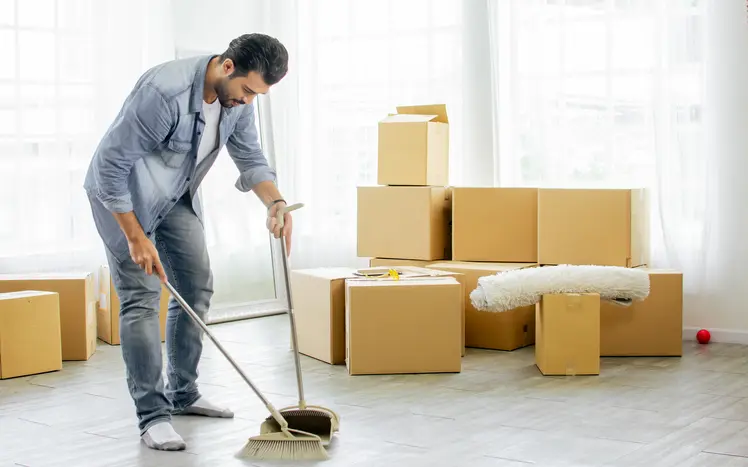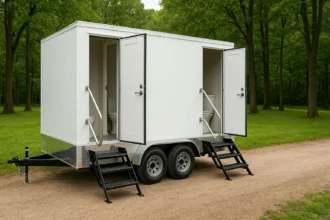Moving out can feel overwhelming. Between packing boxes, coordinating logistics, and handling paperwork, cleaning often gets pushed to the last minute. Yet that final deep clean could be the difference between getting your full security deposit back or losing hundreds of dollars to professional cleaning fees.
Most tenants underestimate just how thorough landlords expect the property to be when they move out. That scuff mark you’ve gotten used to? The soap scum buildup in the shower? These seemingly minor issues can quickly add up on your final inspection. Understanding what move-out cleaning really entails—and why it matters so much—can save you significant money and stress during an already hectic time.
Professional move-out cleaning services like Beehive House Cleaning have seen firsthand how proper cleaning can transform a tenant’s moving experience. When done right, thorough move-out cleaning doesn’t just protect your deposit; it can actually make the entire moving process smoother and more successful.
The Hidden Costs of Skipping Professional Move-Out Cleaning
Security deposits exist for a reason. Landlords use them to cover any damage or excessive cleaning needed after a tenant moves out. What many renters don’t realize is how quickly these costs can accumulate.
Professional cleaning companies typically charge landlords between $200-500 for move-out cleaning, depending on the property size and condition. But here’s the catch: landlords often hire the most expensive services available, since they’re not paying out of pocket. Your $1,200 security deposit could shrink to $700 after cleaning fees, even if the property only needed basic attention.
Carpet cleaning alone can cost $150-300. Deep kitchen cleaning, including inside appliances and removing grease buildup, often runs $100-200. Bathroom deep cleaning, particularly addressing hard water stains and soap scum, can add another $75-150 to your bill. These charges appear itemized on your final statement, making it clear where your deposit went.
The financial impact extends beyond just cleaning fees. Poor move-out cleaning can delay the return of your deposit, sometimes for weeks. This delay can create cash flow problems when you’re already managing moving expenses and potentially a new deposit at your next home.
What Landlords Really Look for During Final Inspections
Landlords and property managers have specific expectations for move-out cleaning that go far beyond basic tidying. They’re looking for a property that’s ready for the next tenant to move in immediately.
Kitchen expectations are particularly strict. Inside the refrigerator, freezer, and all appliances must be spotless. The stove needs to be completely grease-free, including the drip pans and oven interior. Cabinet fronts, especially around handles, should show no fingerprints or food residue. Even the space behind appliances that can be moved needs attention.
Bathrooms require meticulous attention to detail. Grout lines should be white or their original color, not stained or discolored. Shower doors must be free of soap scum and water spots. The toilet needs cleaning inside and out, including behind the base. Mirror surfaces should be streak-free, and all fixtures should shine.
Throughout the property, baseboards, window sills, and light fixtures need thorough cleaning. Walls require spot cleaning to remove marks, scuffs, and nail holes. Floors need appropriate deep cleaning—whether that’s professional carpet cleaning, hardwood restoration, or thorough mopping of tile and vinyl surfaces.
Property managers also examine areas tenants often overlook. Light switch plates, door frames, ceiling fans, and the inside of closets all receive scrutiny. HVAC vents should be dust-free, and any accessible filter should be clean or replaced.
The Psychology Behind Security Deposit Disputes
Understanding why security deposit disputes happen can help you avoid them entirely. Most conflicts arise from differing expectations about what constitutes “normal wear and tear” versus tenant responsibility.
Landlords see hundreds of properties throughout their careers. They know the difference between a unit that’s been cared for and one that’s been neglected. Small details signal larger patterns of care or carelessness. A tenant who takes time to clean baseboards thoroughly likely maintains the property well overall. Conversely, obvious neglect in visible areas suggests potential problems in hidden spaces too.
Property managers also face pressure to prepare units quickly for new tenants. Every day a unit sits vacant costs money. When a previous tenant’s inadequate cleaning delays the turnover process, landlords are more likely to charge for professional services rather than handle cleaning themselves.
The emotional aspect matters too. Moving out represents the end of a business relationship. Leaving a property in excellent condition creates a positive final impression. This goodwill can lead to positive references for future rental applications and sometimes even the return of portions of deposits that could legally be withheld.
Professional vs. DIY: Making the Right Choice
The decision between professional move-out cleaning and doing it yourself depends on several factors beyond just cost. Time constraints often choose busy renters. Packing, coordinating movers, and handling administrative tasks can consume days or weeks. Adding thorough cleaning to this list may simply be unrealistic.
Professional services like Beehive House Cleaning bring specialized tools and expertise that most homeowners lack. Industrial-grade carpet cleaners, professional-strength degreasers, and commercial vacuum systems produce results that standard household equipment can’t match. More importantly, professional cleaners understand exactly what property managers expect.
Experience matters significantly in move-out cleaning. Professionals know which products work best on different surfaces and stains. They understand how to clean efficiently without causing damage. They’re familiar with the specific areas landlords scrutinize most closely during inspections.
However, DIY cleaning can work for motivated tenants with adequate time and the right approach. Success requires starting early, having proper supplies, and maintaining realistic expectations about time requirements. A typical three-bedroom apartment needs 12-16 hours of intensive cleaning to meet move-out standards.
The Timeline Factor: When to Start Your Move-Out Cleaning
Timing can make or break your move-out cleaning success. Most tenants wait until their final week or even final days to begin serious cleaning. This approach almost guarantees either inadequate results or the need for expensive last-minute professional help.
Smart tenants begin move-out cleaning three to four weeks before their lease ends. This timeline allows for thorough attention to detail without the pressure of impending deadlines. It also provides flexibility to address unexpected issues, like stubborn stains that need multiple treatments.
The ideal approach involves cleaning rooms as you pack them. Once a bedroom is empty, clean it completely before moving to the next space. This method prevents the overwhelming feeling of facing an entire dirty, empty apartment in your final days. It also allows time to spot-check your work and address any missed areas.
Professional services need booking well in advance, especially during peak moving seasons in the summer months. Waiting until the last minute often means either paying premium rush rates or being unable to secure service at all.
Making Move Out Cleaning Work for You
Move Out Cleaning is more than just tidying up—it’s a thorough process designed to safeguard your security deposit, maintain your landlord’s trust, and leave your rental in excellent condition for the next tenant. When done correctly, it requires the right mindset and approach. Treat it as an investment in your financial future rather than just another moving task. The money you spend on proper cleaning or professional services almost always costs less than deposit deductions caused by inadequate cleaning.
Documentation proves crucial throughout the process. Take photos before you begin cleaning, during the process, and after completion. These images provide valuable evidence if disputes arise later, especially when emailed to yourself for timestamped records.
Communication with your landlord or property manager helps prevent misunderstandings. Ask specific questions about their expectations, and if they provide a move-out cleaning checklist, use it as your guide to meet their exact standards.
Professional services like Beehive House Cleaning deliver peace of mind that’s often worth the cost. They guarantee results and can return if anything falls short of expectations. For many tenants, this assurance removes the stress and uncertainty of DIY cleaning while safeguarding the full security deposit.
Your move-out cleaning strategy ultimately depends on your circumstances, but the importance of doing it thoroughly remains constant. Whether you manage it yourself or hire professionals, a well-executed move-out cleaning is the best way to finish your tenancy positively and protect your hard-earned money.

















